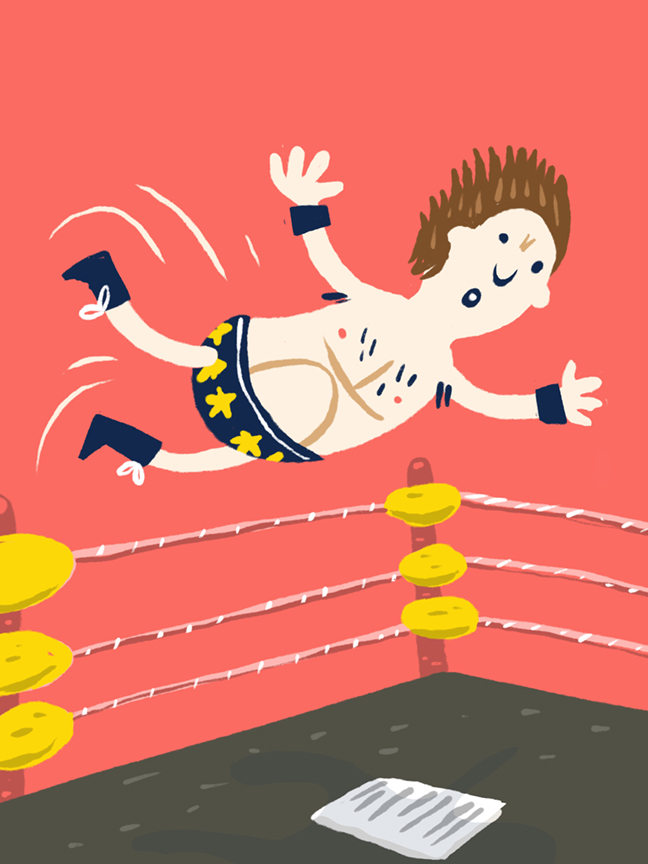There are countless routes to a literary life, the possibilities limitless. In fact, before creative writing undergraduates make their transition into MFA programs, many university faculty members encourage these students to first take an academic hiatus: to work a menial job, to travel, to observe. To foster the art of empathy. To live.
As readers, these are the things we want to see on an author’s book-flap bio: where their emotional experience has been earned and what unlikely tutelage peppers their prose that couldn’t be learned in a classroom. Mine reads, Former professional wrestler.

‘New writers make the same mistakes as new wrestlers…’ Illustration by Josh Quick
I understand the disconnect: grown men in leotards, sweaty, repugnant, and grunting, compared to introverted intellectuals at word processors for hours on end. I get it, having done both, but also know the parallels are worth noting.
I first entered the ring at age eighteen, performing as the surfer-punk persona of “Stunning” Tyler Dunning, not realizing I was establishing what would become my storytelling foundation. The professional wrestling world became my first literary instructor—here are some lessons I keep returning to for guidance.
“Learn What Not to Do”
Fresh out of high school, I moved from an unknown town in the Interior Mountain West to an unknown town in the Midwest, home to one of the best pro wrestling schools in the country: the Harley Race Wrestling Academy. Training consisted of rigorous drilling—learning to fall properly, how to run between the ropes, how to grapple and apply submissions holds without breaking anyone’s arm or leg. But training also consisted of watching and studying videotapes, which were never in short supply because of the school’s reputation.
People wanted to wrestle for us. Harley, the owner and promoter of the school, received boxes of VHS demo tapes (at a time still favoring this antiquated medium) per month. He rarely watched. Instead, he’d pass them on to us, the students, saying, “Learn what not to do.”
These tapes, for the most part, were terrible. That was Harley’s point: to watch and recognize what looked bad in the ring—to pinpoint when someone’s timing was off or why they failed to evoke an emotional response from the crowd.
Writing is the same way. I tell people I dislike about 80% of what I read—and I read a lot. They’re shocked, questioning why I continue with the investment. “I don’t read for enjoyment,” I say. “I read for the craft.” I learned this from wrestling: to let each book, enjoyable or not, sharpen my literary mind, informing me about what works and what doesn’t, and instructing me on how to eliminate similar mistakes in my own work. Hence: every book has value, even the ones teaching you what not to do.
Slower Looks Faster
Every wrestler who is new to the ring does it—assumes that the most dangerous, acrobatic, high-impact moves, repeated over and over, are what impress the crowd and make for a successful match. This couldn’t be further from the truth.
Here’s why: slower looks faster. This means every movement in the ring must serve a purpose, just like words on the page. To execute a move on your opponent because it “looks cool” is the equivalent of using a David Foster Wallace word in a sentence when a Hemingway word would suffice. Crowds like to be awed, yes, but only when it fits into the range of an emotional story arch—and a professional wrestling move only offers an emotional response when we ascribe meaning to it.
The best wrestlers, the ones giving the audience goosebumps with their matches, are often the most basic. They make every motion count. Everything tells a story—from the way they enter the ring to the way they use a headlock. It’s slow, it’s methodical, and it gives the viewer time to process and enjoy the journey so that when those big moves do happen—limited usually to one or two per match—they mean something.
New writers make the same mistakes as new wrestlers, thinking their story arcs need to be unnecessarily complicated and their language too complex, all in the hopes it will appear sophisticated and impress the reader. This usually has the opposite effect. Slower looks faster, with periods as wrist locks and commas as body slams. Know why you’re using them and make each one count.
Suspend Disbelief
Ric Flair was one of the world’s best wrestlers, but he couldn’t do a dropkick. So he didn’t. What does this mean to the writer? There are countless literary tools at your disposal, just like there are countless wrestling moves, but that doesn’t mean you have to utilize them all. Play to your strengths.
Flair understood this, knowing his restraint would make his matches graceful and seamless. And now, if you were to ask any fan if they knew whether Flair used a dropkick, they wouldn’t remember. Because he played to his strengths. But if he had done a dropkick, viewers would remember because the ugly act would’ve broken their hypnosis. Because entertainment suspends the consumer’s disbelief, allowing them to enter an imaginary realm and feel real emotions while there. That’s the reward for subscribing. And believing.
Writers can do the same things. They don’t have to use an M dash if they don’t want to or be a master of dialogue. One should utilize the tools they are most capable of using—maybe by increasing tension or writing the confessional without sounding self-indulgent. Whatever the case, reward your reader for choosing you and leave them with an emotional response by which they will cherish you.
Believe in Your Work First
The final lesson: remember that no one is going to believe your writing until you do. For example, in a tag team wrestling match, I’d often find myself outside the ropes while my partner was in the ring grappling our opponents. Of course the thing was scripted, and of course, I knew what was coming next, but that can become the problem: standing on the apron, thinking about everything that’s coming, and forgetting to react to what’s occurring. Hence, if my partner was slammed and I didn’t react to the over-played pain, then the crowd would see this and subconsciously think, If that guy, the one who has more invested in this match than anyone else here, doesn’t care, then why should I?
As a performer, even one hidden behind the pages of a manuscript, the writer must remember that if he or she doesn’t believe in their own work first, then why would anyone else give a damn. This isn’t to say you need to be arrogant or self-indulgent, but a reader’s time is precious. And it’s not their job to inform you if you’re doing a good job. It’s your job to know you’ve trained long enough, and hard enough, to step in the ring, as a writer, and wrestle.
